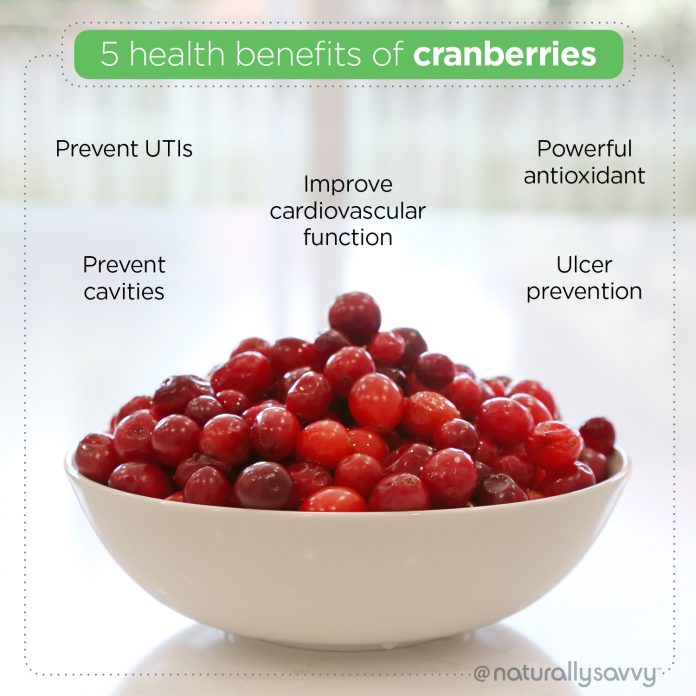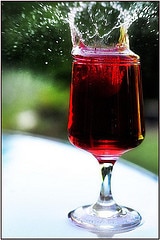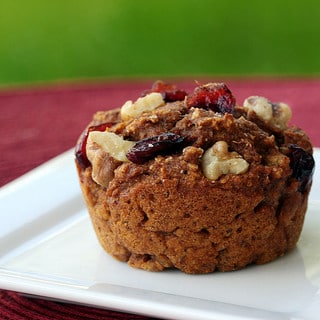
Fresh, dried, frozen, or as a sauce, cranberries are very popular this time of year.
Packed with antioxidants, cranberries have one of the highest scores on the ORAC (Oxygen Radical Absorbance Capacity) scale, scoring even higher than blueberries and blackberries! This is important for combating free radicals that our body produces as a result of stress, exposure to toxins, and lifestyle choices that might not be the best ones for us.
The Cranberry Institute provides information about ongoing research on the various properties of the tart-tasting berry.
Here are five of the most important health benefits that have been identified:
1. Cranberry Juice Helps Prevent UTIs
A Japanese study found that women aged 50 and over who drank 4 ounces of cranberry juice daily for six months suffered from fewer urinary tract infections than women drinking a placebo beverage. Another study showed that children who drank cranberry juice daily had a 65 percent lower incidence of UTIs than children in the placebo group.

2. Cardiovascular Benefits for Postmenopausal Women
Researchers at the University of Hong Kong found that cranberry juice improved vascular function and cholesterol profiles in an animal study. They concluded that the beverage may be beneficial for postmenopausal women, helping to combat potential risk factors for cardiovascular disease by protecting LDL-cholesterol (“bad” cholesterol) from being oxidized.
3. Powerful Antioxidants
Cranberries contain the flavonoid proanthocyanidins (PACs). Their unusual structure offers bacterial anti-adhesive properties that may help prevent the adhesion of certain harmful bacteria. Utiva offers a dose of 36 PACs in their UTI formula and this is the dose shown to improve symptoms of UTIs.
4. Fewer Dental Cavities
Critical Reviews in Food Science and Nutrition (2002) reported that saliva samples from subjects using a mouthwash containing properties extracted from cranberry showed a reduction in Streptococcus mutans colony forming units compared with the placebo group (unpublished data). A large percentage of dental caries (cavities) can be attributed to S. mutans.
5. Ulcer Prevention
A constituent of cranberry juice has been shown to inhibit the adhesion of Helicobacter pylori to human gastric mucus in vitro, suggesting that cranberry may be beneficial in the prevention of peptic ulcers.

Food or Supplement, and How Much?
Most of the research on cranberries indicates that the most powerful effects result from ingesting the whole food rather than from taking extracts or supplements. The health benefits listed above can be attained from these amounts:
- ¼ cup fresh cranberries
- 1/3 cup dried cranberries (unsweetened)
- ¼ cup cranberry sauce
- 2 oz. 100% cranberry juice
- 8 oz. 27% cranberry juice cocktail.
Bottom Line
Whether they’re used in your baking (biscotti, anyone?), cooking, stuffing, or as a snack, cranberries are good for you!
Continue to enjoy the health benefits of cranberries even after the holidays with these great suggestions:
- Add a handful to your morning bowl of oatmeal
- Add a tablespoon to muffin recipes
- Include them in a trail mix
- Sprinkle them over a salad
- Mix some cranberries into a rice or quinoa dish
- Toss some into a casserole dish with cubed sweet potatoes or butternut squash.
Photo credits: JLM Photography, Christi @ Love From The Oven
Recipe ideas for cranberries:
All Natural Cranberry Sauce Recipe
Gluten-Free Orange-Cranberry Bread Recipe




